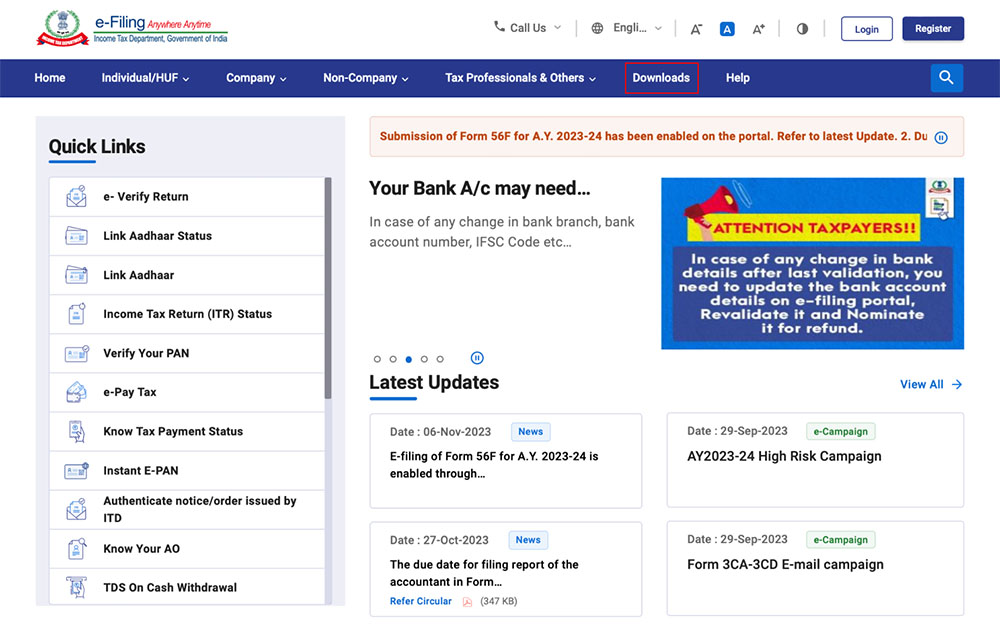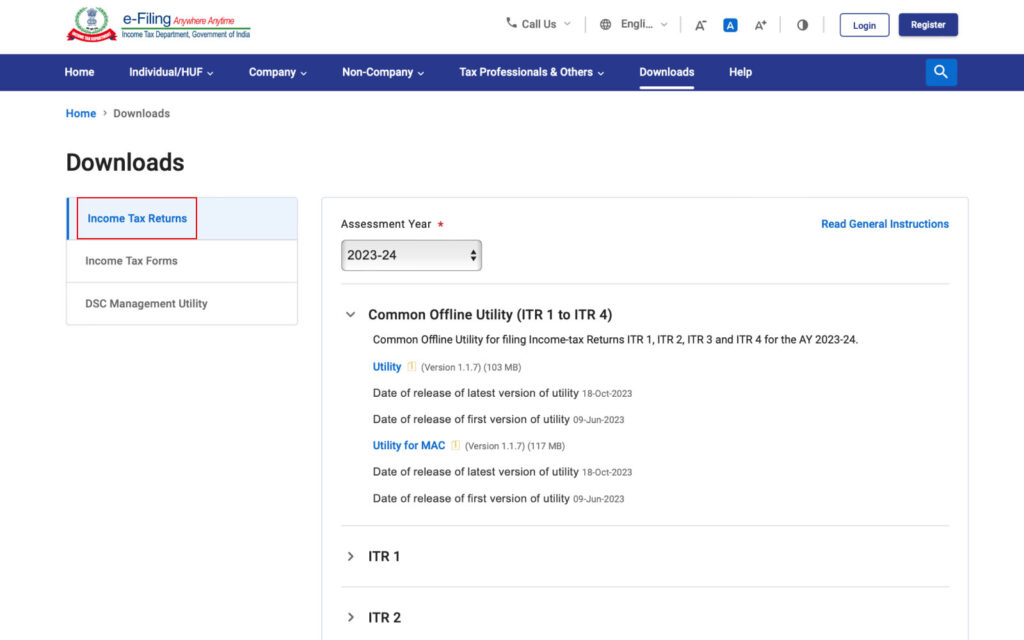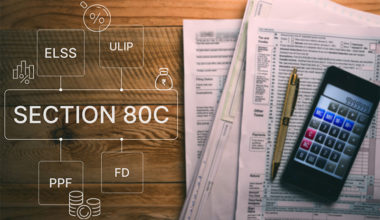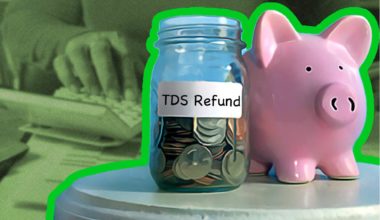Filing income tax returns is an important financial responsibility for individuals and businesses alike. While the due date for filing IT returns serves as a crucial deadline, there may be situations where you miss the deadline. Whether it’s due to unavoidable circumstances or any other reason, the question remains: What should you do if you need to file your IT returns after the due date?
In this detailed blog, we will go through the step-by-step process of filing income tax returns after the due date. While it’s advisable to file your returns on time, we will explore the options available to help you fulfill your tax obligations even if you missed the original deadline.
Step-by-Step Process to File IT Returns After Due Date
- Begin by visiting the official website of the Income Tax Department
- On the homepage, click on the ‘Downloads’ option on the top menu.

- From the available options, select ‘Income Tax Returns’ and proceed to download the appropriate ITR utility required for your belated return.

- After downloading the utility, extract and unzip the files to a location of your choice on your computer.
- Open the utility and fill in the necessary information in the designated form. Once completed, generate the XML file.
- Log in to the website using your PAN card details, and access the e-file menu.
- Within the e-file menu, select the ‘Income Tax Return’ option.
- To ensure the security of your submission, go through the user verification process and upload the previously generated XML file.
- Once the XML file is successfully uploaded, click on the ‘Submit’ button to proceed with the submission of your belated ITR.
- You will be asked to enter an OTP (One-Time Password) as an additional security measure. Input the OTP provided and your belated ITR will be officially submitted.
What Happens If You Miss the ITR Filing Deadline?
Failure to meet the deadline can result in various penalties and interest charges, which can cause a financial burden. Late submission of ITRs may even lead to employment suspension or termination by employers.
When taxpayers in India miss the deadline for filing their tax returns, several consequences may occur:
- Penalties: Individuals with a total income exceeding Rs. 5 lakh face a penalty of Rs. 5000 for late filing. However, for those with a total income up to this limit, the penalty is Rs. 1000.
- Interest Payment: Failure to file income tax returns by the due date will result in interest being charged at a rate of 1% per month or part of a month on the outstanding tax amount, as per section 234A. It is crucial to pay the taxes before filing the ITR.
- Penalty under Section 271H: According to section 271H, if a person fails to file the TDS/TCS return (statement of tax deducted/collected at source) by the prescribed due dates, they will be subject to a penalty. The minimum penalty is Rs. 10,000, which can go up to Rs. 1,00,000.
Due Dates for Filing ITR for FY 2023-2024 (AY 2024-2025)
| Category of Taxpayer | Due Date for Tax Filing – FY 2023-24 |
|---|---|
| Individual / HUF/ AOP/ BOI (books of accounts not required to be audited) | 31st July 2024 |
| Businesses (Requiring Audit) | 31st October 2024 |
| Businesses requiring transfer pricing reports (in case of international/specified domestic transactions) | 30th November 2024 |
| Revised return | 31st December 2024 |
| Belated/late return | 31st December 2024 |
Points to Consider While Filing Income Tax Returns
1. Accurate Reporting
Ensure that all your income sources such as salary, interest, dividends, capital gains, rental income, and any other relevant earnings are properly reported. You must provide complete and correct information to avoid any discrepancies or potential audits in your ITR.
2. Proper Documentation
Gather and organize all supporting documents, such as Form 16, Form 26AS, bank statements, investment proofs, rent receipts, and any others. These will serve as proof of your income, deductions, and tax liabilities.
3. Eligible Deductions and Exemptions
Familiarize yourself with the eligible deductions and exemptions allowed under the Income Tax Act, such as those for home loan interest, medical expenses, tuition fees, and contributions to certain investment schemes. Make sure to claim all applicable deductions to reduce your tax liability.
4. Form Selection
Choose the correct ITR form based on your income sources and the category to which you belong. Different forms cater to different types of taxpayers, such as individuals, businesses, and organizations. Using the appropriate form ensures accurate reporting and avoids unnecessary confusion.
5. Timely Filing
File your ITR within the specified due dates to avoid penalties and interest charges. Ensure that you meet the deadline, which is July 31 of each assessment year, unless extended by the tax authorities. Filing ITR on time not only avoids penalties but also allows you to claim timely refunds, if applicable.
6. Electronic Filing
Prefer to file your ITR electronically using the online ITR portal. E-filing ensures faster processing, reduced errors, and convenient access to previous years’ returns and tax-related information.
7. Verification and Signature
After filing your ITR online, verify the return using either Electronic Verification Code (EVC), Aadhaar OTP, or physical verification by sending a signed copy of the ITR-V to the Centralized Processing Center (CPC) within the specified timeframe.
Also Read: How to E-Verify Your Return Using Your Net Banking
8. Review and Cross-Check
Before submitting your ITR, review all the details entered such as personal information, income, deductions, and tax calculations properly. Cross-check the numbers against the supporting documents to minimize errors.
9. Preserve Records
Keep copies of your filed ITR, acknowledgment receipts, and supporting documents for future reference and audit purposes. Maintain these records for at least six years from the end of the relevant assessment year.
10. Seek Professional Assistance
If you find the ITR filing process complex or have complicated financial situations, consider seeking guidance from a tax professional or a CA (Chartered Accountant) to ensure accurate filing and compliance with tax laws.
Check out: Income Tax Calculator to Calculate Your Taxes
Conclusion
While filing income tax returns after the due date may attract penalties and interest charges, it is still possible to fulfill your tax obligations by filing a belated return. By following the prescribed procedures, paying any outstanding taxes, and submitting the necessary documents, you can ensure compliance with tax regulations.
It is important to act quickly, seek professional guidance if needed, and stay updated with the latest rules and regulations to avoid any complications and penalties in the future. Remember, even if you miss the deadline, it’s important to file your IT returns and fulfill your tax obligations to stay on the right side of the law and maintain financial transparency.
Disclaimer: This blog is written to make it easy for readers to understand complicated processes. Some information and screenshots may be outdated as government processes can change anytime without notification. However, we try our best to keep our blogs updated and relevant.










